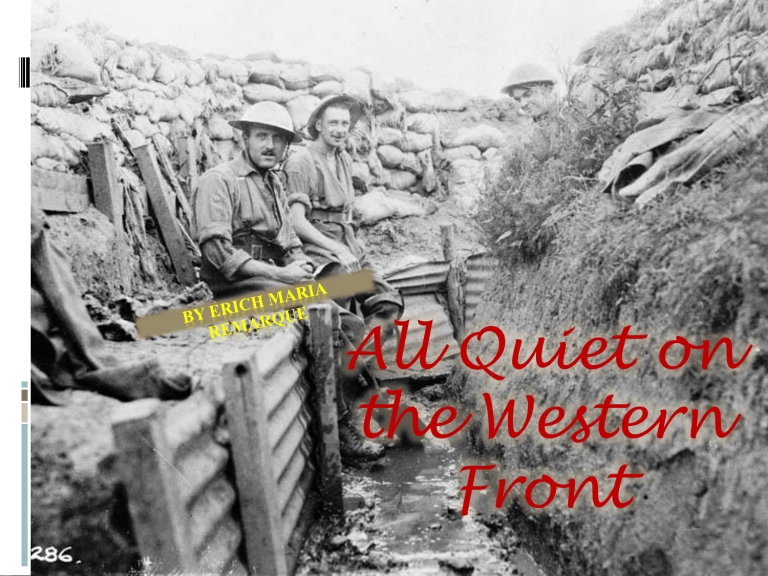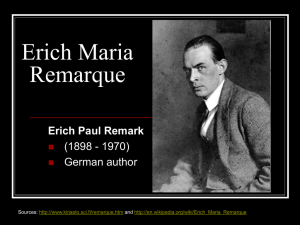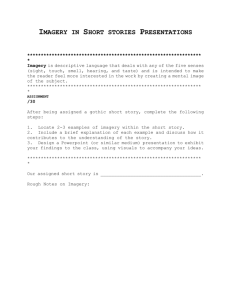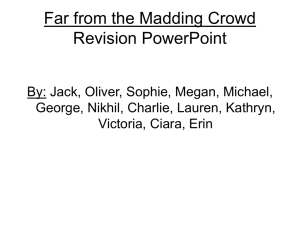Truths of War All Quiet on the Western Front

All Quiet on the Western
Front
Erich Maria Remarque
“
This book is to be neither an accusation nor a confession, and least of all an adventure, for death is not an adventure to those who stand face to face with it.
It will try simply to tell of a generation of men who, even though they may have escaped its shells, were destroyed by the war.” (Remarque 6)
"It is just as much a matter of chance that I am still alive as that I might have been hit. In a bomb-proof dug-out
I may be smashed to atoms and in the open may survive ten hour's bombardment unscratched. No soldier outlives a thousand chances. But every soldier believes in Chance and trusts his luck."
Remarque During the War
Notes packet should include the following background info on page 1:
Describe the alliance system that was established before WWI.
Describe how and why this war was more advanced and deadly than most previous wars.
Describe what the Western Front was.
Describe what trench warfare was and what
“No Man’s Land” was.
Explain why the went on for years in stalemate.
Remarque’s Technique: PARALLELISM
Style and structure: Paul as a poet; Moments of quiet reflection juxtaposed with intense action.
Definition: The use of successive verbal constructions in poetry or prose that correspond in grammatical structure, sound, meter, meaning, etc.
From the Greek, "beside one another”
Ex 1: “Mankind must put an end to war, or war will put an end to mankind.”
-John F. Kennedy
Ex 2: "Immature poets imitate; mature poets steal.” –T.S. Elliot
Parallels create repetitions and rhythm, accentuating certain words or phrases to impact the audience.
Evaluate how Remarque uses parallelism, combined with another technique to impact the reader.
The creation of poetry: Sensory details (imagery)
“Preludes” by TS Elliot:
The winter evening settles down
With smell of steaks in passageways.
Six o'clock.
The burnt-out ends of smoky days.
And now a gusty shower wraps
The grimy scraps
Of withered leaves about your feet
And newspapers from vacant lots;
The showers beat
On broken blinds and chimney-pots,
And at the corner of the street
A lonely cab-horse steams and stamps.
And then the lighting of the lamps.
Imagery:
Imagery=SENSORY DETAIL
Each type of imagery is paired with an example from TS Elliot’s poem
“Preludes”:
Visual imagery pertains to sight, and allows you to visualize events or places in a work. Ex: “ and then the lighting of the lamps.”
Auditory imagery pertains to a sound. Ex: “ The showers beat on broken blinds and chimney-pots.”
Olfactory imagery pertains to an odor.
Ex: “ Six o'clock. The burnt-out ends of smoky days.
Gustatory imagery pertains to a taste. Ex: “ The winter evening settles down with smell of steaks in passageways.”
Tactile imagery pertains to a texture or sensation of touch. Ex: “ And at the corner of the street, a lonely cab-horse steams and stamps.”
Kinesthetic imagery pertains to movement, or an action. Ex: “ A lonely cab-horse steams and stamps.”
Organic imagery pertains to feelings of the body, including hunger, thirst, and fatigue
Ex : “and now a gusty shower wraps the grimy scraps of withered leaves about your feet”
Animal imagery: Why?
Literal: Deplorable living conditions (rodents, lice)
Figurative: Represent the pain inflicted on people through other creatures (horses)
Men dehumanized (beasts)
Figurative: Animals as representative of instinct, the primitive part of the self –
(hunting like animals/hunted like prey)
FIGURATIVE LANGUAGE: non-literal language; secondary meaning or significance
Figurative language
Personification
Pathetic Fallacy
Simile
Metaphor
Oxymoron
Idiomatic expressions
Symbolism
Hyperbole
Synecdoche
Pun
PATHETIC FALLACY:
Natural world personified
Weather or nature reflective of human emotions
Ex: “the all-cheering sun” (-Shakespeare)
Pathos=empathy, emotion
PERSONIFICATION is when inanimate objects, or ideas are given qualities as if they were alive. It could also be when animals are given human qualities.
Personification vs. pathetic fallacy:
Ex: The wind howled through the trees.
Ex: The car died of exhaustion.
The return home
Symbols of war and home
Paul’s disconnection
Male vs. female responses
Erich Maria Remarque studied at the University of
Münster but had to enlist in the German army at the age of 18.
He fought on the Western Front and was wounded several times.
After the war, Remarque worked as a teacher, a stonecutter, and a test-car driver.
He became famous after his first novel, All Quiet on the Western Front
touched a nerve of the time
sparked off a storm of political controversy
Militarism
• Competition for military power
• Build up of military in
Germany
• France vs. Germany
Alliance System
• For peaceful purposes
• Protection of nations
• The Triple Alliance :
Germany, Austria-Hungary, and Italy
• Triple Entente: Britain,
France, and Russia.
Imperialism
• Competition for colonies
• Colonies in
Africa and
Asia.
Nationalism
• Patriotism
• Competition for the largest army and navy
• Competition for the greatest industrial development.
Spark
Serbian murdered Archduke Franz Ferdinand, heir to the
Austrian throne.
Austria asked for and received from Germany a "blank check" of support for any action Austria-Hungary might take against Serbia.
Austria reacted by declaring war on Serbia. The Russians prepared to defend Serbia.
Germany declared war on Russia.
France came to the aid of its Russian ally by declaring war on Germany.
The British hesitated, but when the Germans marched into Belgium, they declared war on Germany as well.
Italy, the third member of the Triple Alliance, refused to back Germany and Austria-Hungary.
Italy claimed the Triple Alliance was for defensive purposes only and Austria's declaration of war against
Serbia was not defensive.
Allied Powers included France, Great
Britain, and Russia (and eventually the US).
Central Powers
Central Powers included Germany, Austro-Hungarian
Empire, and the Ottoman Empire.
On day I of the Somme offensive, 36,000 British troops wounded
More than 35% of all the German men who were btw
19 and 22 when the fighting started were killed in the next 4 1/2 yrs; many others grievously wounded
One half of all Frenchmen aged 20-32 at war ’ s outbreak were dead when it was over
For 3 years, the armies on the Western Front were locked in place
Trenches were sometimes 40 ft below ground
Barbed wire
Loss of Innocence
Truths of War
Hopes, Dreams, Plans
Sacrifice
Death
Primitiveness
Innocence is almost an enemy in All Quiet on the Western Front – a soldier must get rid of it right away if he wants to survive.
Our narrator learns to lose his innocence others around him, but also through his own experiences. And he consciously feels – and particularly our narrator's fact that they sacrifice for unknown reasons gives rise to great and
– concept in order to keep sane and in order to stay entering the fray, recruits only a year or so younger than he is, but far more innocent.
of being hunted. Lots of animalistic imagery thread throughout the novel, highlighting the wilder urges that the men face.
Nov. 1916: Drafted into German army at age 18
Sent to Western Front; worked in a support unit laying barbed wire and building bunkers and dugouts
Wounded several times, once seriously while retrieving an injured soldier during an attack
Spent most of the rest of the war recuperating in a military hospital; his mother died from cancer during this time
Worked as a tombstone salesman, substitute teacher, organist, and freelance journalist
Suffered from depression (now post-traumatic stress disorder); began writing All Quiet on the Western Front to come to terms with his experience.
AQWF published in 1929; an international bestseller
In first year sold more than 1 million copies in Germany; translated into 23 languages
Nominated for Nobel Prize for Literature
Movie made in 1930 won Academy Award—Best
Picture
Paul Baumer (narrator) enlisted with his classmates in the
German army of World War I. Youthful, enthusiastic, they become soldiers.
But despite what they have learned, they “ break into pieces ” under the first bombardment in the trenches.
And as horrible war plods on year after year, Paul holds fast to a single vow: “ to fight against the principles of hate that meaninglessly pits young men of the same generation but different uniforms against each other ” --if only he can come out of the war alive.
Novel viewed as a humanitarian antiwar statement
Attacked by Nazi party
Hitler and Nazis viewed the “ message ” of the book as unpatriotic, pacifist, and anti-nationalist
Remarque forced to leave Germany; moved to
Switzerland in 1931
AQotWF was burned in public by the Nazis, who declared it as a “ betrayal of the soldiers of the First
World War ”
Remarque ’ s German citizenship revoked by the Nazi party in 1938
Creed that places loyalty to the political and economic goals of one ’ s nation above all other public considerations
Strong national identity
Sense of entitlement: to colonize, to build up the military
What ’ s good for the country is good for the people
Moved to US in 1939 and became a citizen
Friends with Greta Garbo, Ernest Hemingway, Charlie
Chaplin, F. Scott Fitzgerald
Continued to write until his death in 1970, including a sequel to AQotWF, The Road Back, about veterans trying to assimilate back into civilian culture
Refers to those who came of age during or after WWI
Developed a pessimistic and uncertain outlook on life and society
Had feelings of disillusionment, despair, emptiness, cynicism
Started to question traditional authority figures and values
Remarque forced to leave Germany; moved to
Switzerland in 1931
AQWF was burned in public by the Nazis, who declared it as a “ betrayal of the soldiers of the First World War ”
Remarque ’ s German citizenship revoked by the Nazi party in 1938
In Germany, before WWI:
Teachers and parents were respected and obeyed
Educational system emphasized dry memorization of facts, not teaching students to think for themselves
Nationalism, patriotism, duty were unquestioned
The brutal realities were far different from the “ glory ” and “ heroism ” that elders had led young men to expect
Many survivors blamed the older generation for allowing the war ’ s “ ghastly and wasteful destruction ”
Paul Baeumer in All Quiet on the Western Front:
“ We are forlorn like children, and experienced like old men . . . I believe we are lost.
”
• How would you feel if, immediately after you graduated from high school, you were sent off to fight a war and during this time, you were put in the position of having to make the choices like the ones we just discussed? How do you think you would adapt to life of a soldier? How would your attitude be influenced if you felt the war you were fighting was “ unnecessary ” ?
• Is there such a thing as a necessary war? If so, when and under what circumstances?
• How do you think the war experience would be different if you were fighting face-to-face with the enemy versus deploying bombs from airplanes, submarines, or even a computer workstation in a building somewhere?
How do you imagine the experience of war would change you and affect the rest of your life? What are your impressions of war?
Protagonist: Paul Baumer
Secondary: Stanislaus Katczinsky
Background characters: Muller, Tjaden, Albert Kropp, Kimmerich,
Leer, Haie Westhus, Detering
Kantorek (their Schoolmaster)
Corporal Himmelstoss
Baumer, Muller, Leer and Kropp went to school together and were encouraged to enlist Kantorek. All are age nineteen.
Tjaden, Westhus and Detering are lower class workers or farmers.
Katczinsky is the oldest and becomes a mentor or father figure to
Paul.
PART I:
The book opens five miles behind the front. Kimmerich has just died.
After the excerpt, we follow Paul with the Second Company to the front line where he experiences a bombardment of French bombs, trench warfare and death on an intimate level.
Juxtaposed with the harsh experiences of war, we also learn of the intimate camaraderie that develops between the group as they work together to find food, and battle against lice and rats.
We learn of Kat’s amazing ability to scavenge and are privy to the debates the boys have on the merits of fighting a war that they did not start.
Half way through the book, Paul is given leave and returns home to find that his mother is very sick and bedridden. He is reunited with his boyhood items but is now so disconnected from the boy he was just a few years ago that he is filled with a profound sadness. He ends his visit with the thought “I ought never to have come on leave” (Remarque 160).
PART II:
Half way through the book, Paul is given leave and returns home to find that his mother is very sick and bedridden. He is reunited with his boyhood items but is now so disconnected from the boy he was just a few years ago that he is filled with a profound sadness. He ends his visit with the thought “I ought never to have come on leave” (Remarque 160).
After his leave and before returning to the front, Paul is stationed on the base for additional training and is assigned to guard the Russian POWs, an experience which makes him question the validity of the German propaganda.
He returns to the front and feels unable to reintegrate into the group. He is rusty and finds himself making mistakes that he wouldn’t have if he had never gone on leave. After a routine patrol into no man’s land, he finds himself paralyzed by fear behind enemy lines and forced to kill a French soldier.
After coming under fire while evacuating a town, Paul and Albert are wounded and bribe their way into a military hospital where a new group of injured soldiers bond. They even conspire to help one of them sleep with his wife who comes to visit after years apart.
Paul is discharged and returns to the front.
The book ends with the knowledge of the inevitable defeat of the German army and a montage of each character’s death, culminating with Paul’s death on the last page.
WWI
Propaganda
The war
The soldier’s life
Life in the trenches:
Using at least ten phrases or words from the book and at least ten phrases or words from the article, create a montage poem.
The poem should portray the reality of life as a soldier in an authentic and clear manner.
In Flanders Fields
Lieutenant Colonel John McCrae, MD (1872-1918)
Canadian Army
Symbol: examine the title and text for symbolism
IN FLANDERS FIELDS the poppies blow
Between the crosses row on row,
That mark our place; and in the sky
The larks, still bravely singing, fly
Scarce heard amid the guns below.
Images: identify imagery and sensory details
We are the Dead. Short days ago
We lived, felt dawn, saw sunset glow,
Loved and were loved, and now we lie
In Flanders fields.
Take up our quarrel with the foe:
To you from failing hands we throw
The torch; be yours to hold it high.
If ye break faith with us who die
We shall not sleep, though poppies grow
In Flanders fields.
Figures of Speech: analyze figurative language and other devices (use the terms on the handout).
Tone and Theme: discuss how all devices reveal tone and theme
Sift through the poem. What is the tone and theme of this piece? How does this parallel at least one passage from the novel? Support with specific example from the text.



